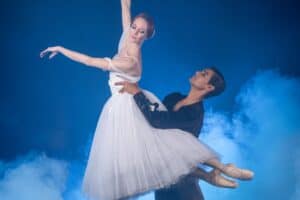In his notes in the programme, director Bobby Heaney expresses his surprise at noticing that Paul Slabolepszy's darkly funny Pale Natives has become "a period piece".

The original was written to interrogate the impact that the dawning of South African democracy in 1994 was having on middle-aged white South African men, who were clumsily searching for meaning in their various ways as it was – and now had to factor in a whole new institutionalised reason for feeling sorry for themselves.
The setting is a seedy lounge in a sports club in Johannesburg’s eastern suburbs. The reason the four protagonists are in the same room is because they’re attending a stag party for a fifth friend. Bristling awkwardness is the default setting early on, with the urbane Ashley (Dowds) arriving early and expressing dismay at the state of the venue before Roux (Coleman) and Eddie (Cairns) arrive to set everything up. Kyle (Newton) arrives – typically, as the audience discovers – late and makes his presence felt with an expletive-ridden rant.
This is an exceptionally strong cast. Inevitably, they will be compared to the original quartet who played the roles – the late Bill Flynn, Paul Slabolepszy, Tim Plewman and Danny Keogh – but to audiences seeing the piece for the first time that will make no difference and the acting is of such a standard that fans of the 1994 version will concede they have something every bit as good 20 years later.

STALE NATIVES. From left: Kyle (Lionel Newton), Dave (Iain Paton, under the table) and Eddie (James Cairns) feel the effects of a long night. Picture: Ruphin Coudyzer.
Everyone is good, though James Cairns as the sweet, childishly simple Eddie repeatedly steals the show with observations audiences can laugh at in this context (though possibly not in reality, as they’d likely be accused of being condescending).
Newton’s insecure, brash Kyle is the sort whose worldview was defined by the roles he and his companions played in high school, but as he gets more inebriated as the party progresses, that facade starts to slip. A moment at the end causes the bottom to drop out of the world of any audience member who was relating to the angst and bewilderment felt by the characters – it’s powerful, emotional stuff, brilliantly delivered.
Pale Natives may look a little dated, referencing tape decks and faxes, but Slabolepszy’s writing is profoundly good, asking the same difficult questions now that it did two decades ago.
Support Local Journalism
Add The Citizen as a Preferred Source on Google and follow us on Google News to see more of our trusted reporting in Google News and Top Stories.








